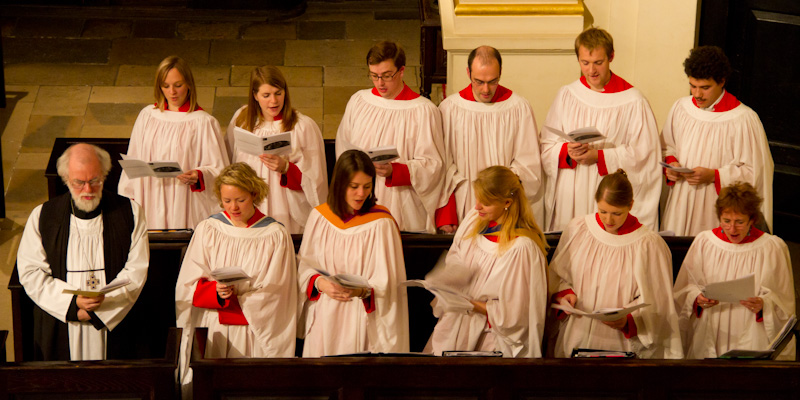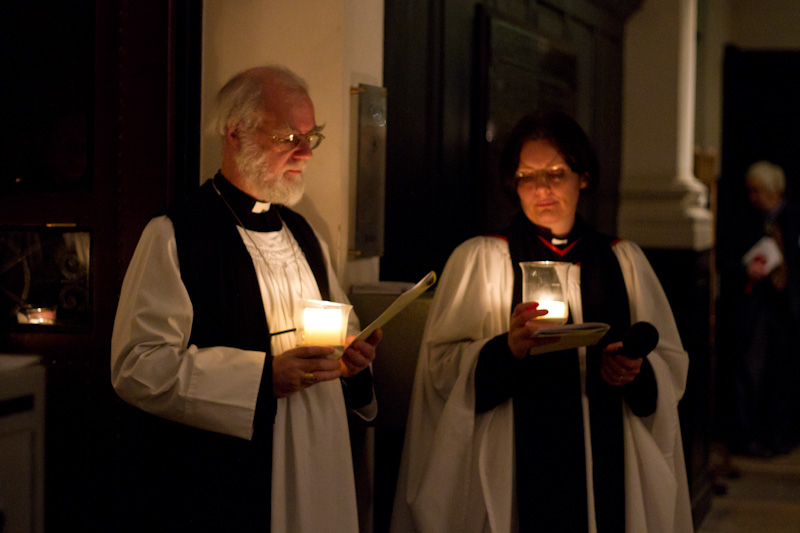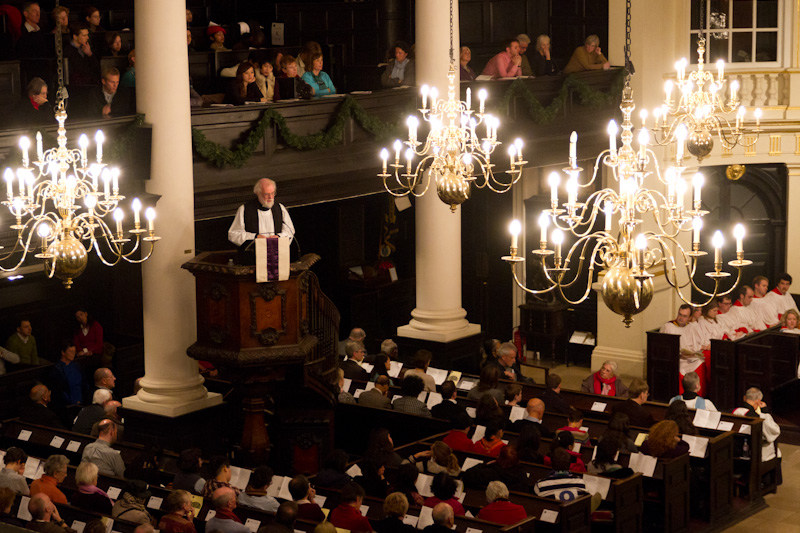Advent Carol Service at St Martin-in-the-Fields
Sunday 27th November 2011
The Archbishop of Canterbury preached at an Advent Carol Service at St Martin-in-the-Fields in Trafalgar Square.The service explored the church's Advent theme of "Heaven in Ordinary", and music was provided by the Choir of St Martin-in-the-Fields.

In his sermon, the Archbishop referred to a spiritual teacher from the early church who said that there are three ways of seeing things - a diabolical way, an angelic way, and a human way. The diabolical way, he explained, is to see everything in terms of oneself and the angelic way is to see everything in terms of one's relationship with God. Humans, however, have the ability to see the world in relation to God but often insist on seeing it in terms of themselves. We need, the Archbishop said, to peel away from the diabolical way and align ourselves with the angelic way - to look at the world and see it "pregnant with God".
"Understand that this is something you will never contain or control. All you can do is open your eyes, draw in your breath, receive what is to be received, and step forward. That’s where our human seeing and knowing start to become that little bit more angelic."
Listen to an audio file of the Archbishop's sermon, or read a transcript below.

Archbishop Rowan Williams and the Revd Katherine Hedderly. Photo: Marc Gascoigne
Sermon by Archbishop Rowan Williams
Readings:
- Genesis 28.10-17
- Exodus 3.1-8a
- Isaiah 6.108
- 1 Samuel 3.1-10
- 1 Kings 19.4-13a
- Luke 1.26-38
After the sermon:
- Luke 1.46-55
Time was when what we were supposed to do in Advent was to think about the four last things: death, judgement, heaven and hell. Rather different from thinking about cards, turkeys, puddings and whatever else. And the trouble with the four last things, when we put it in those terms, is that they don’t seem to be about now. They're about tomorrow. They’re about what’s going to happen. Yet at the same time it seems that in Advent we’re always being told, ‘Now is the time’. Now is the moment where we have to live. Now is where our concentration and attention belongs. And in all the readings we've had this evening the emphasis has been upon our eyes being opened here, and now - heaven in ordinary. Not death, judgement, heaven and hell as something which with any luck we won’t really have to worry about for a while but truth itself pressing in upon us, making room in our world here and now, today.
And I want to think for a moment about what it means to have our eyes opened to the present moment in Advent, and what we might do and how we might think and feel as we move towards Christmas seeking not to worry about the future but to live in this moment and to find the last things here; to find death, judgement, heaven and hell here in our hearts today.
And for help with that I'm going to turn back for a few centuries to a remark thrown off rather casually by a very great spiritual teacher of the early Church who said that there are three ways of seeing things: a diabolical way of seeing things, an angelic way of seeing things, and a human way of seeing things.
The diabolical way of seeing things is to see absolutely everything in terms of you. The devils can only think of the world as something for them. They are constantly attempting to control and contain the world, to stuff it into their own egos. They have no imagination, the devils. (That, I'm afraid, is why they're going to lose in the long run.)
Angels see things in terms of their relationship with God. They're full of imagination. When they look at the world, when they look at you and me, they see the extraordinary potential buried in us because they see us in our relationship with God. The Angel Gabriel comes to Mary and says, ‘You may be a teenager in a village nobody has heard of, on the edge of the Roman Empire in an occupied country, without any education, without a vote, without even a change of clothes, and you are going to be where God happens.’ (The Angel Gabriel is strong on imagination.)
And we human beings, well of course we’re poised between devils and angels, no surprises there. We have the capacity of seeing things in an angelic way. God’s made us capable of seeing the world in relation to him. And yet again and again we insist on seeing it in terms of its relation to ourselves. We exploit the world. We squeeze it dry. We pile up the goods of the world so that we can pretend that we’re safe. We invent any number of vastly complicated systems, some of them perfected in this city of London, to keep us, as we imagine, secure from uncertainty and from suffering. And we complain bitterly when that doesn’t work.
So our human way of seeing and knowing things has to be more and more peeled away from that temptation to the diabolical, and became more and more aligned with the angelic way of seeing things; an angelic way of seeing things, just like the Angel Gabriel. Look at the world and see it pregnant with God. And as you see it pregnant with God understand that this is something you will never contain or control. All you can do is open your eyes, draw in your breath, and receive what is to be received and step forward. That’s where our human seeing and knowing starts to become that little bit more angelic. And it’s in that process that we discover something about death, judgement, heaven and hell, sure enough.
Death because of course that’s what we’re all afraid of. And this particular message of the Gospel in Advent tells us that death is what you have to go through in order for truth to live in you, the death of all those things that you want to use to keep you safe. And the way you react to that apparently not terribly good news, the way you react to that with patience, with protest, with joy, with terror, that’s judgement. That’s what decides the kind of person you're going to be. And if by some extraordinary miracle of love, trust, and grace you're able to face death and step into it and beyond it for the sake of the truth, that’s heaven. And if you’re stuck in a constant unwillingness to face your death and the truth that lies beyond it, that’s hell. The four last things? Well yes, but four last things that are happening right now, right here, in you and in me, pretty well every moment.
So once a year Advent comes along and tells us ‘here is the worst possible news in the world. In order to be truthful and alive you're going to have to die.’ What’s your reaction? How do you judge yourself in the presence of the truth of God?
But Advent says something else as well - the point of letting go of all our longings to control and contain the world, the point of saying with a great gulp and a lot of shaking of the voice ‘yes’ to the death of all our fantasies, is so that something will be uncovered, something in the world will flower that we can never have imagined.
I wonder if you noticed in all the readings that we've had so far the people who have visions are people who’ve been uprooted, people who’ve been shaken. Poor old Jacob, who thinks he’s secured his future by defrauding his brother and is now, perhaps rather predictably, running for his life from the brother he’s defrauded. He has nothing. He has no plan, no property. And there he is, to his own obvious surprise, with heaven laid open before him. Moses forty years into exile, forty years of keeping sheep in the Sinai peninsula (quite a fate), and he turns aside and sees the bush on fire. Elijah running for his life from the secret police of the state and the still small voice summons him on the far side, a fire and wind and earthquake. Displaced persons; persons who had to face a kind of death; and because of that freedom something comes through of a world they can’t control, in beauty and in terror. They're our companions, our patrons on the Advent journey. They're the ones who show us a bit of what it’s like to walk towards death without panic. The ones who tell us that when we let go the world happens in a splendour and fullness we can’t begin to imagine as yet.
And at the end of that four week journey what happens? We’re faced with the greatest most shocking paradox of all: the power, the love and the energy that made and sustains the universe - speechless, helpless, cold, homeless, a baby. It’s as if once we’ve started letting go of all our fantasies and all our hopes about getting the world under control, we’re on the way to coming to terms with a God who will run away from our hopes of control and understanding, the God who is beyond compare.
When you have piled up everything you know about power in the world you will have said nothing about the power of God. When you have piled up all that you know of love in the world you’ll have hardly begun to say anything about the truth of God’s love. And when you have filled heaven and earth with all the words you can think of, the word of God comes through in the silence of the night at Bethlehem. As we let go of our hopes and fantasies of controlling, containing, securing the world and ourselves, it’s not just that we’re allowing the world to be itself. At the end of the day we’re allowing God to be himself; allowing God to be not one thing among others, not one little bit of the world jostling for position with other bits of the world, for God to be, and to be that life from which all being and all life flows.
And it seems we can only get that point when we see that energy, that power, in the weakness of God made flesh among us. We turn from that extraordinary vision to heaven in ordinary, to looking at our neighbours and the things of our world with new eyes, looking with those wide angelic eyes that see everything and everyone around us as pregnant with God, as capable of surprising us into new life and new vision and new action. We begin to see a world transformed.
Heaven in ordinary is a phrase from that poem of George Herbert’s, entitled simply ‘Prayer’. And it ends with a twofold image: ‘the milky way, the bird of Paradise’, he says, that is prayer: the journey to heaven, the restoration to paradise. But it is also ‘something understood’: very, very simple, very immediate. Not something distant in space or time but here and now. A moment of understanding, angelic understanding, seeing the world in relation to God in its own life, its own beauty, its own freedom.
Learning to respond to God with joy and gratitude, learning that out of that response comes real communion, true generosity, authentic hope; and in and through that, beginning simply to grow very slowly towards the confrontation with his mystery and his truth that is on the far side of death: our judgement, our hell, our heaven, our death, our everlasting life.
© Rowan Williams 2011

